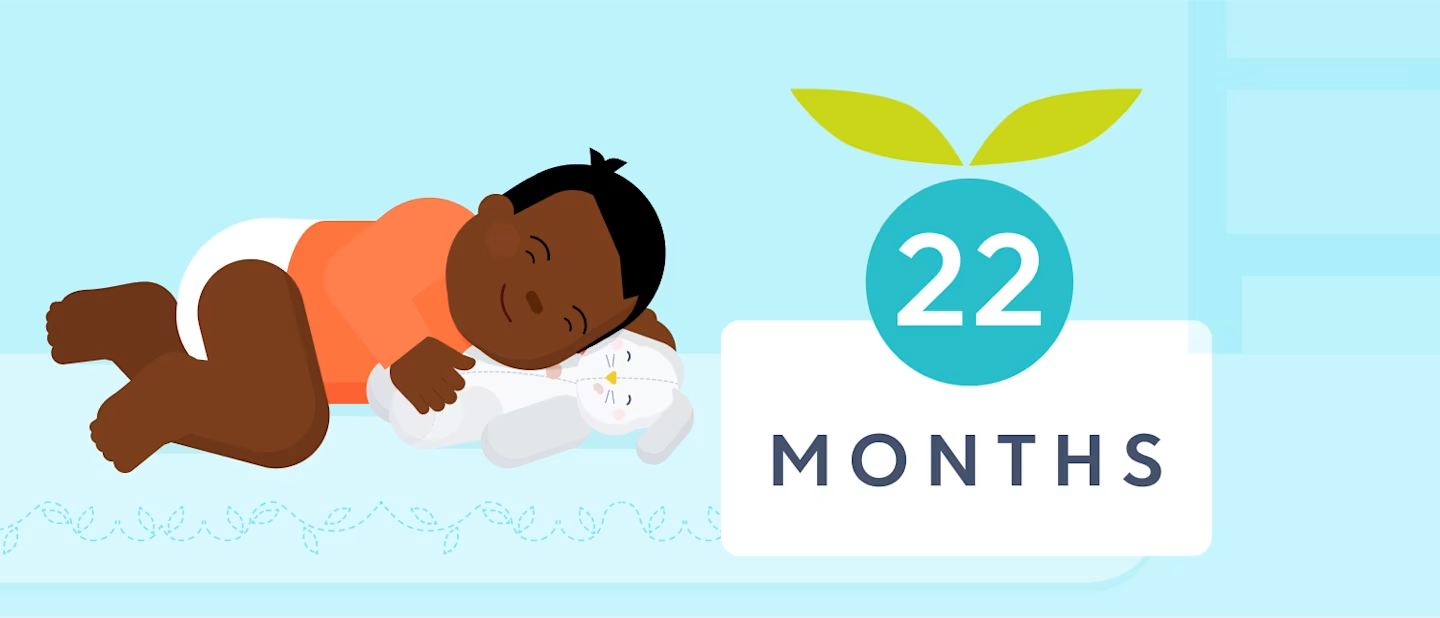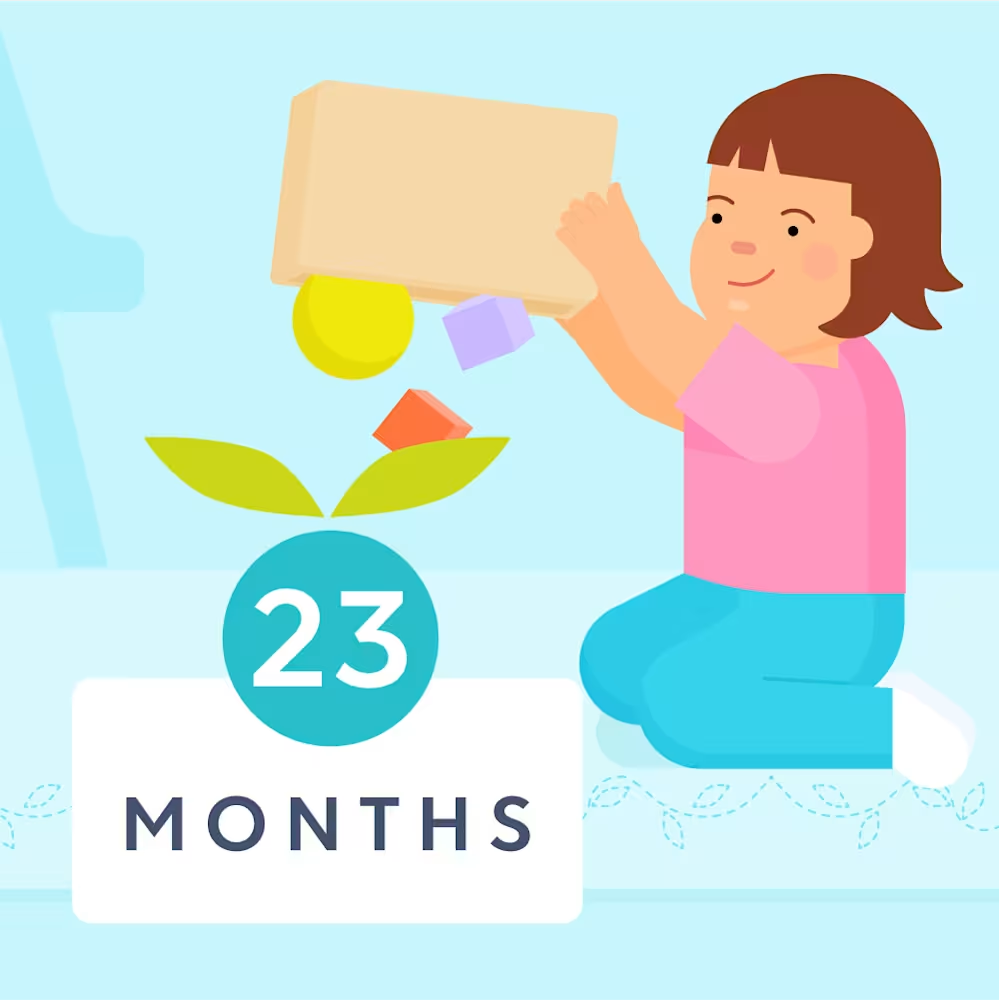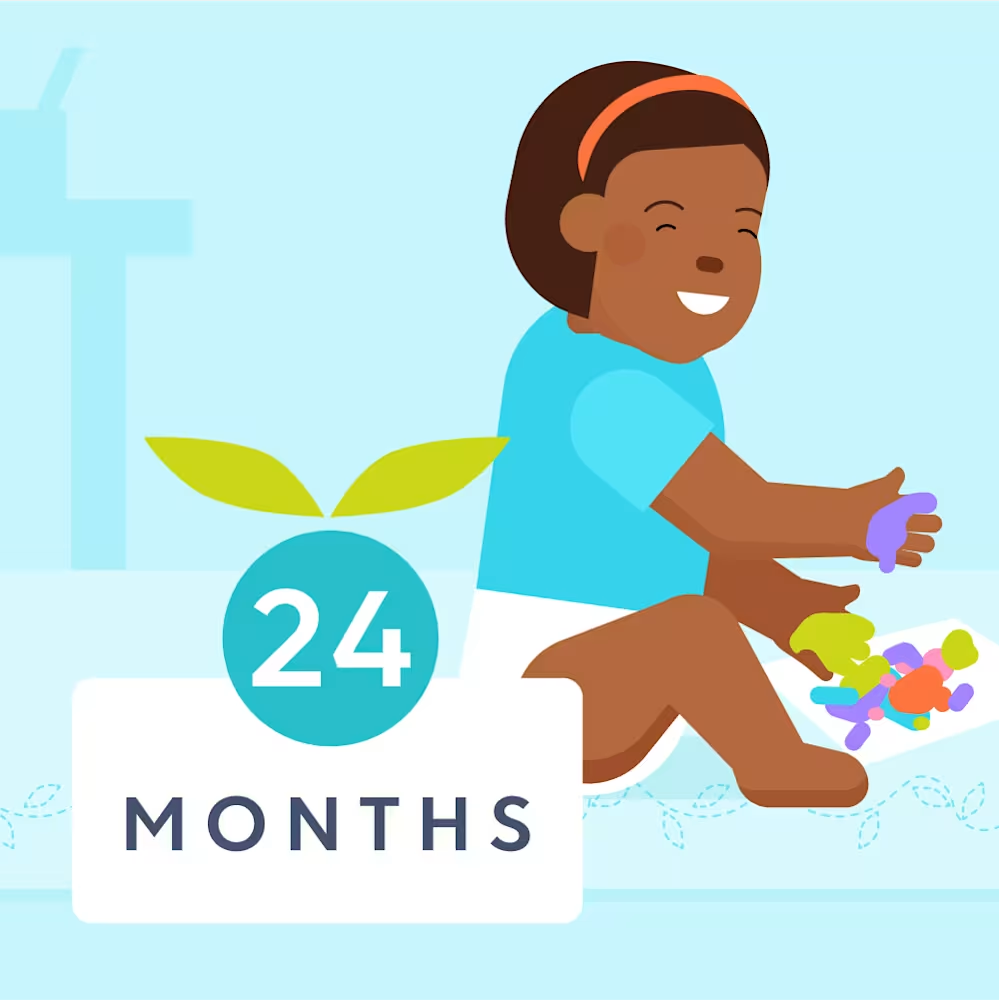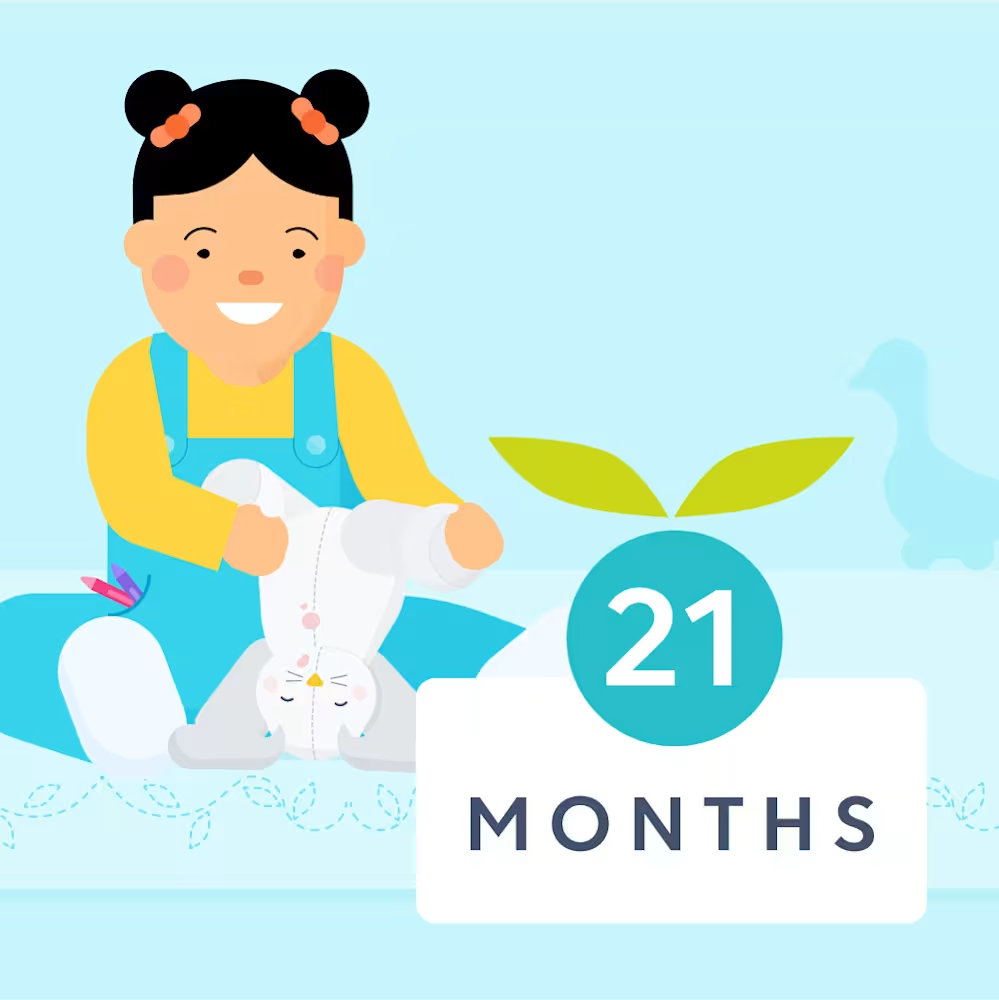22 month old sleep schedule: Bedtime and nap schedule
Updated Dec 15, 2025

At this age, whether it’s time to get dressed or load up in the car, one phrase you might hear often is, “I do it!” This desire for independence is a natural part of toddler development and allows your child to practice problem-solving skills. Ensuring your child is well-rested will help give them the patience and energy to succeed.
In this article, we’ll walk you through a typical 22 month old sleep schedule and provide tips for overcoming common issues like bedtime battles, skipped naps, and newfound independence.
How much should a 22 month old sleep?
At 22 months, we recommend aiming for about 12.5 hours of total sleep over 24 hours so your little one is sufficiently rested. This often breaks down to about 10 - 12 hours of nighttime sleep and 1.5 - 2.5 hours of daytime sleep.
Here's a quick overview of what you may expect when it comes to 22 month olds and sleep. Note that these figures are averages and should be used as guidelines.
Top sleep tip for 22 month olds
Try empowering your kiddo by offering limited choices. Toddlers crave independence, and offering simple choices can reduce bedtime battles. Try:
“Do you want the bunny pajamas or the dinosaur ones?”
“One book or two books tonight?”
"Do you want to give goodnight hugs to your teddy bear or dolly?"
This gives your toddler a sense of control within boundaries, which helps bedtime feel less like a power struggle.
Sample 22 month old sleep schedule

Note: Sleep needs vary by child and this chart should be viewed as an example.
Morning rise: 7:30 AM
Wake window before nap: 5.25 hours
Nap: 12:45 PM - 2:45 PM (2 hour nap)
Get ready for bed: 7:45 PM
Wake window before bedtime: 5.75 hours
Asleep: 8:30 PM
Naptime schedule for a 22 month old
Most 22 month olds do best if they’re still — they need that precious sleep for brain development and to recharge to make it to bedtime. At this age, many do well with a nap set in the middle of the day (5.25 - 5.5 hours after they typically wake in the morning).
How long should a 22 month old nap?
Aim for around 1.5 - 2.5 hours of daytime sleep at this age. If your child is regularly fighting naptime, consider adjusting the naptime and continue offering them quiet time in their crib or sleep space. This gives them time to rest and, ideally, they fall asleep after a while. Even if they don’t, this solo time is good for developing independent play habits and can provide a much-needed break for you!
How many naps for a 22 month old?
We recommend offering one daily nap to children at 22 months. Most kiddos aren’t ready to fully stop napping until closer to 3. However, skipped/short naps happen! If your child frequently skips naps or takes short ones, it can lead to chronic overtiredness. Try moving bedtime a bit earlier to help them catch up on rest — just avoid putting them down before 6:00 PM, as that can lead to even earlier morning wake-ups.
1-nap schedule
1-nap schedule with short nap/early bedtime
Bedtime for a 22 month old
After a busy day spent playing and learning, it’s important that your toddler has time to relax and unwind before bed. About an hour before bed, you can help your child know sleep is on the horizon by dimming the lights, putting away stimulating toys, and turning off screens.
What time should a 22 month old go to bed?
An ideal bedtime for your 22 month old is one that regularly allows for 10 - 12 hours of sleep overnight. While sleep needs vary, kiddos typically need more sleep at night if they take shorter naps, while they’ll need less sleep at night if they take longer naps. We recommend aiming for a consistent bedtime that usually allows for 5.5 - 5.75 hours of awake time in between the nap and bedtime. It’s common for toddlers this age to have bedtimes between 6:30 - 8:30 PM.
Why does my 22 month old keep waking up at night crying?
If you find your little one is waking up overnight again, some factors that may be at play include:
Separation anxiety
Illness
Parent-led sleep associations
Seeking independence
Mastering milestones
Teething
If you’re looking for more sleep support, consider submitting for a personalized, step-by-step Sleep Plan via .
Is there a sleep regression at 22 months?
There isn’t a 22 month sleep regression that automatically means sleep patterns go out the window as soon as your child is this age. Instead, contributing factors (like separation anxiety, developmental milestones, teething, and illness around 22 months) can lead to new sleep challenges like early waking, overnight waking, skipped or short naps, and bedtime resistance.
Can my 22 month old sleep with a pacifier?
Many parents are concerned about the long-term effects of pacifier use (beyond age 2–4). However, teeth alignment and mouth development usually aren’t impacted until permanent teeth start coming in. While some experts recommend addressing the habit around age 3, while the AAP suggests most kids won't need treatment until age 5 [].
Can a 22 month old sleep on their stomach or side?
At 22 months, your toddler can safely sleep on their stomach or side if they roll there independently and can move both front to back and back to front. Sleeping in a preferred position is a normal part of toddler development.
Can I sleep train a 22 month old?
Sleep training is one way to help your to fall asleep without help (e.g. being rocked, patted, or fed to sleep). When deciding to sleep train, pick the method that fits your child and parenting preferences. There are various to consider — not all are “cry it out.” Some are gradual and take longer while others produce faster results and may have more tears upfront. However, this is typically short-lived.
What are the developmental milestones for a 22 month old?
At 22 months, here are some things your child may be trying or doing. Keep in mind all toddlers develop at their own pace — your kiddo may not be doing all of these things yet and that’s OK.
Uses simple phrases (18 - 24 months)
Uses two- to four-word sentences
Follows simple instructions
Begins make-believe play
Sorts objects by shapes and colors
Eats with a spoon (19 - 24 months)
Starts to jump with both feet leaving the ground
Climbs on low furniture
Walks up and down stairs (with support)
Kicks large ball
Runs
Stands on tiptoes
Can pull toys behind them while walking alone
Flips switches on and off, turn knobs, and press buttons
Scribbles
Stacks 5+ or more small blocks or toys
Does a 22 month old need to eat during the night?
Most 22 month olds won’t need to eat overnight. However, if dinner is served early and you suspect your child is waking up hungry overnight (or super early in the morning asking for breakfast), consider offering a pre-bed healthy snack or moving dinnertime a bit later to see if that helps. Kiddos usually sleep best with a fully tummy!
Takeaway
We recommend aiming for about 12.5 hours of total sleep over 24 hours so your little one is sufficiently rested. This often looks like 10 - 12 hours of nighttime sleep and 1.5 - 2.5 hours of daytime sleep.
Most 22 month olds do best if they’re still napping once a day. If your kiddo is resisting naptime, try shifting it a little later instead of dropping it altogether.
An ideal bedtime for your 22 month old is one that regularly allows for 10 - 12 hours of sleep overnight. It’s common for toddlers this age to have bedtimes between 6:30 - 8:30 PM.
If you're curious about what lies ahead in the coming month, glimpse into the future to see what you might experience once your baby is on a . Also check out a to see how far your little one has come.
Share article:
Note: The content on this site is for informational purposes only and should not replace medical advice from your doctor, pediatrician, or medical professional. If you have questions or concerns, you should contact a medical professional.
2 Sources
Share article:






